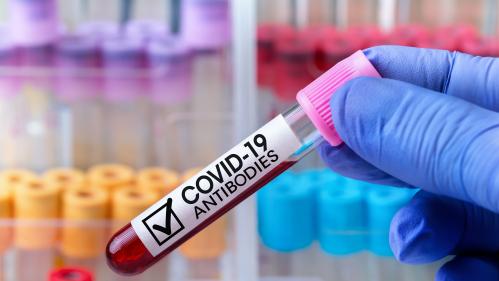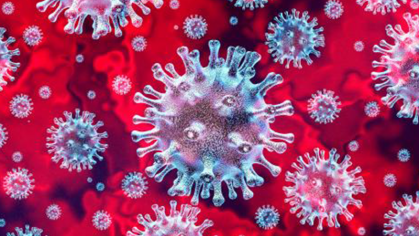Immune Response to COVID-19 May Be Proportional to Illness Severity, Duration

People with severe or prolonged COVID-19 achieve the highest antibody levels, Rutgers study finds
People who have had severe or long-lasting cases of COVID-19 are more likely to have high levels of an important antibody needed to fight against future infection, according to a Rutgers study.
The findings were published in The Journal of Infectious Diseases.
The study was part of the Rutgers Corona Cohort study, which followed 548 health care workers and 283 non-health care workers from the start of the pandemic to better understand risk factors, antibody responses and symptoms of SARS-CoV-2 infection.
The researchers found that, within 6 months of the start of the study, more than 93 of the total 831 participants – or 11 percent – tested positive for SARS-CoV-2, the virus that causes COVID-19, or for antibodies. Of those 93, 24 were severely symptomatic and 14 were asymptomatic. Health care workers were much more likely to become infected and develop severe symptoms, with nurses showing particularly high infection rates. One-third of the infected participants had symptoms – such as fatigue, shortness of breath and loss of taste and smell – that lasted at least a month; 10 percent had symptoms that lasted at least four months.
Most people infected by SARS-CoV-2 develop antibodies against the virus, but immune responses vary considerably, with a minority of infected people not producing detectable antibodies. The study showed that most participants had sustained immunoglobulin G (IgG) antibodies up to six months after infection regardless of symptom severity. However, antibody production did vary based on severity of symptoms: 96 percent of participants who had severe symptoms were found to have IgG compared to 89 percent of the participants with mild to moderate symptoms and 79 percent who were asymptomatic.
“Neurological changes, including brain fog and problems with memory or vision, were infrequent among infected participants but did tend to last for many months when they occurred," said co-lead author Daniel B. Horton, an assistant professor of pediatrics and epidemiology at Rutgers Robert Wood Johnson Medical School, the Institute for Health, Health Care Policy and Aging Research and the Rutgers School of Public Health. "Notably, having persistent symptoms was also associated with having higher antibody levels over time. We know from other research that vaccination further enhances immune protection and sometimes even helps ease long-term symptoms.”
“It is normal for antibody levels to decline over time. Nevertheless, IgG antibodies provide long-term protection to help the body fight reinfection,” says co-lead author Emily S. Barrett, an associate professor of biostatistics and epidemiology at Rutgers School of Public Health and a member of Rutgers Environmental and Occupational Health Sciences Institute.
While other studies looked at sick or hospitalized populations with symptomatic illness, the Rutgers study recruited people before they were diagnosed with SARS-CoV-2 infection and evaluated people across a spectrum of illness severity, including those who were asymptomatic, providing broader insight into antibody response over the long term.
Other Rutgers authors include Jason Roy, Maria Laura Gennaro, Tracy Andrews, Patricia Greenberg, Natalie Bruiners, Pratik Datta, Rahul Ukey, Senthil K. Velusamy, Daniel Fine, William J Honnen, Yue Sandra Yin, Abraham Pinter, Andrew Brooks , Jay Tischfield, Sabiha Hussain, Sugeet Jagpal, Shobha Swaminathan, Veenat Parmar, Nancy Reilly, Sunanda Gaur, Reynold A. Panettieri Jr., Jeffrey L. Carson and Martin J. Blaser.


